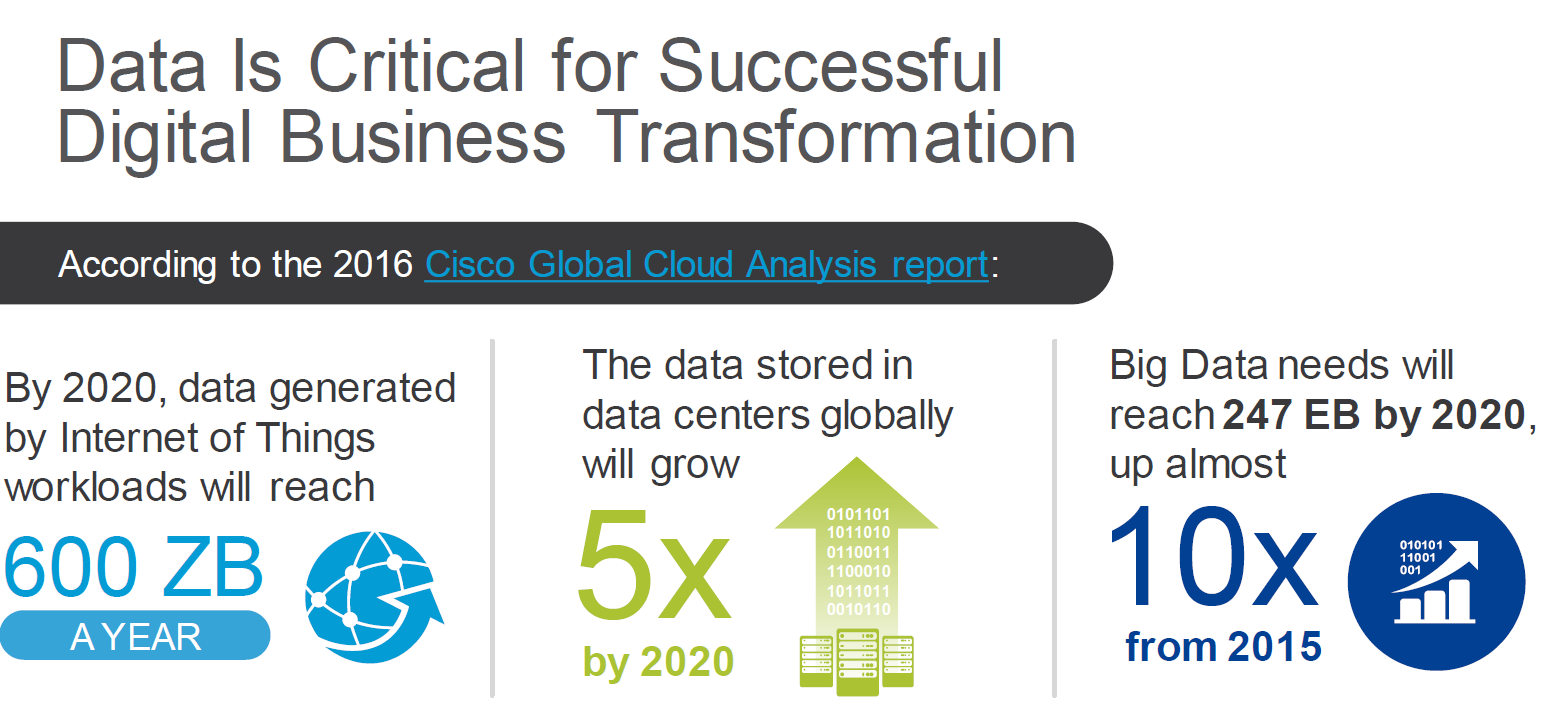
Cisco Aims to Shrink Big Data Skills Gap

(Dean Drobot/Shutterstock)
Cisco Systems today introduced new educational offerings aimed at narrowing the looming skills gap in the areas of data analytics and digital transformation. In particular, the new analytics program is designed to help Cisco customers make sense of the zettabytes worth of new data that will be collected over the Internet of Things in the coming years.
There are two major parts of today’s announcement. First, Cisco introduced a new Data and Analytics track to its educational portfolio to address the need for certified professionals who possess big data management skills. Secondly, Cisco revamped its existing Data Center track to keep up with the changing technical realities of today’s data center operations.
The changes will help ensure Cisco customers ensure that their IT staffs have the right skills for next-gen workloads, especially IoT projects, says Tejas Vashi, senior director of product strategy and marketing at Cisco Services.
“By 2020, we expect things like IoT to really drive heavy workloads around data and analytics,” Vashi tells Datanami. “We’re beginning to see a huge increase in data workloads and we’re anticipating over 600 zettabytes a year in terms of workload size by 2020. That makes sense when you think about the fact that across the Internet we’re expecting 50 billion endpoints to be out there, installed and collecting these data, for various applications, by that same time-frame.”
Nearly 3 million IT professionals have Cisco certifications, and the industry has come to expect those Cisco certifications to translate into real-world skills required to tackle the latest tech challenges, Vashi says. “With all the technology changes occurring in the industry, you can imagine that making sure the talent is also there and aligned with these technologies shifts is very critical,” he says.
The new Data Analytic courses and certifications are centered on Cisco products and technologies used in big data. This includes the Cisco Unified Computing System (UCS) lines of converged servers and products, as well as the Cisco UCS Integrated Infrastructure for Big Data and Analytics product line.
But the courses go beyond teaching people how to setup, run, and manage Cisco products, and extends into ensuring that IT professionals have skills across a variety of big data disciplines, says Antonella Corno, a senior manager at Cisco Services.

Source: Cisco
“It’s no longer about boxes of physical infrastructure, but really is about enabling seamless deployment into cloud, mobile connectivity, extraction of data, and tying it all into applications,” she tells Datanami. “They need to be able to deploy those platforms, and we need to make sure they know how to use them and know how to integrate an application deployed on top of that.”
For example, a Cisco customer in retail may be looking to generate recommendations for consumers as soon as they walk into a store. The retailer knows who the customer is and has a certain amount of time to make an offer or generate a coupon to entice the customer into spending money with them.
“That kind of application that is really driving business for the company–those applications are what today companies are looking at,” Corno says. “They’re looking at the infrastructure as the tool for them to extract the intelligence and do something with it that’s bringing business back to them.”
Cisco is a giant in the networking space, and is expanding its footprint in the systems market with its successful UCS lines. As data analytics rises in importance and gobbles up CPU and network resources, Cisco wants to stay ahead of the curve. Last March, Cisco launched its Digital Network Architecture (DNA) to do exactly that.
Cisco is rolling out five course offerings in the Data and Analytics track. That includes three computer information systems (CIS)-level courses, ANCISB (CIS Basic), ANCISV (CIS Advanced) and ANCISM (CIS Administration). On top of this, Cisco is rolling out ANDMB, a Big Data Analytics, Architecture and Management course, and ANDMA, an Advanced Big Data Analytics, Architecture, Management and Applications course.
The new Data and Analytics courses do not cover data science aspects of big data analytics, however. Instead, the courses are focused more on the technical and engineering aspects of designing and running big data workloads at scale.
Meanwhile, Cisco has updated its Data Center track to keep up with the latest technologies. The company has revised its CCNA, CCNP, and CCIE Data Center certification exams to reflect the latest key skills, technologies, and industry best practices for data center infrastructure. Specifically, the changes were made to incorporate changes in network management, automation, authentication, security, unified computing, and advanced virtualization.
Related Items:






























